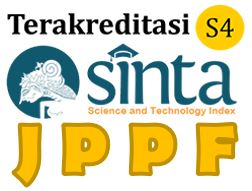Role of Physics Student Worksheet Integrated PBL Model to Improve the 21st Century: A Systematic Literature Review
DOI:
https://doi.org/10.24036/jppf.v11i2.32Keywords:
Student Worksheet, Problem-Based Learning, 21st-century skills, Literature ReviewAbstract
This study aims to systematically analyze the role of Problem-Based Learning (PBL)-b Student Worksheets in improving 21st-century skills, which include critical, creative, collaborative, and communicative thinking skills in physics learning. The method employed is a literature review, examining 15 relevant national and international articles published between 2015-2025. The results of the study show that the implementation of PBL-based student worksheet is consistently able to improve critical thinking skills through scientific analysis and reflection activities, as well as encourage students' creativity in producing innovative ideas based on contextual problems. In addition, the incorporation of collaboration rubrics and digital-based activities has been proven to strengthen interaction, responsibility, and communication between students in physics learning. The integration of digital collaboration aspects and authentic assessment makes the student worksheet not only a learning medium but also a means of strengthening scientific character and social skills in the 21st century. This research makes an important contribution to the development of PBL-based physics learning tools that are relevant to the challenges of the digital era and can be used as a reference for teachers and curriculum developers to create active, reflective, and collaborative learning.
Downloads
References
Ardha, R., & Emiliannur, A. (2025). The design of the Student Worksheet (LKPD) is integrated with Problem Based Learning (PBL) to facilitate students' creative thinking skills. Journal of Innovative Education, 13(2), 145–158.
Azrina, N., & Sandika, B. (2023). The development of e-LKPD based on Problem-Based Learning to train students' critical thinking skills on respiratory system material in class XI Science. Journal of Nusantara Biology Education, 10(1), 34–45.
Damayanti, L., Rahmadani, E., & Syahrial, D. (2024). Development of PBL-based LKPD: A study of validity and practicality for critical thinking skills in elementary mathematics learning. Journal of Basic Learning Innovation, 8(1), 11–20.
Dewi, F. S. (2023). Development of digital LKPD to improve critical thinking skills and train collaborative skills of grade XI students. Journal of Science and Technology Education, 11(2), 95–106.
Evanti, D., & Mawartiningsih, L. (2024). Improving students' critical thinking skills using interactive e-LKPD media based on the Problem Based Learning model. Journal of Modern Physics Education, 6(1), 21–31.
Hayati, N., & Nuriyah, T. S. (2023). Development of LKPD PBL (Problem Based Learning) Model in Training Students' Critical Thinking Skills. Journal of Binomial Studies, 6(2), 175–185.
Hidayati, R., & Puspitasari, N. (2023). The Effect of the Use of Digital LKPD on Students' Physics Learning Activities and Outcomes. Journal of Physics and Science Education (JPFS), 12(3), 211–220.
Kain, C., Koschmieder, C., Matischek-Jauk, M., & Bergner, S. (2024). Mapping the landscape: A scoping review of 21st century skills literature in secondary education. Teaching and teacher education, 151, 104739.
Khovivah, R., Gultom, R., & Lubis, E. (2022). The development of LKPD based on Problem Based Learning and its influence on students' critical thinking skills. Journal of Science Learning Innovation, 8(2), 102–111.
Kurniawati, W., Harjono, A., Gunawan, G., Busyairi, A., & Taufik, M. (2021). Development of Project-Based Physics Learning Tools to Improve Students' Communication Skills. Journal of Physics and Technology Education, 7(2), 141-146.
Ma'arif, M., Nissa, D. F., Aulia, S. S., & Immaniar, D. N. (2023). The use of live worksheets as E-LKPD pancasila education materials for intercultural collaboration in Indonesia. Journal of Social Morality, 8(1), 16-23.
Matsuda, Y., Falcon, A., Porter, A., Royer, A., Mohnkern, L., Vergara, D., & Valiente, Y. (2024). Implementation of problem-based learning modules in an introduction to public health course. Frontiers in public health, 12, 1405227.
Munawaroh, N. A., & Budijastuti, W. (2023). Development of PBL-based LKPD on respiratory system materials to train critical thinking skills of high school grade XI students. Journal of Biology and ScienceEducation, 12(2), 87–96.
Novendra, A., Prasetya, D., & Wulandari, R. (2024). The development of PBL-based e-LKPD has the potential to train high school students' collaboration skills on simple harmonic motion materials. National Journal of Physics Education, 8(2), 133–142.
Prafitasari, A. N., Sa'adah, U., & Eurika, L. (2024). Development of LKPD environmental change material based on the rubric of 21st Century Learning Design class X collaboration ability. Journal of Physics Education and Learning, 9(1), 33–44.
Seifert, T. (2024). Enhancing Online Self-Assessment of Collaborative Work through Cocreating Rubrics. Journal of Educators Online, 21(1), n1.
Susanti, R., & Rohman, F. (2025). Improving critical thinking skills by developing Problem-Based Learning (PBL) based on LKPD for grade 2 elementary schools. Pendas: Scientific Journal of Basic Education, 10(3), 514-527.
Susanti, R., & Rohman, F. (2025). Improving critical thinking skills by developing Problem-Based Learning (PBL) based on LKPD for grade 2 elementary schools. Pendas: Scientific Journal of Basic Education, 10(3), 514-527.
Thornhill-Miller, B., Camarda, A., Mercier, M., Burkhardt, J. M., Morisseau, T., Bourgeois-Bougrine, S., ... & Lubart, T. (2023). Creativity, critical thinking, communication, and collaboration: Assessment, certification, and promotion of 21st century skills for the future of work and education. Journal of Intelligence, 11(3), 54.
Umar, I., & Yakub, P. (2025). Development of Blended Learning Respiratory System Materials for Blended Learning PBL to Train Students' Critical Thinking Skills. BioEdu, 14(1), 54–61. https://doi.org/10.26740/bioedu.v14n1.p54-61
Widiyono, A., & Ghufron, A. (2025). Improving Creative Thinking Skills Through the PjBL-STEM Model assisted by LKPD Life Cycle Diology. JOURNAL OF EDUCATION, 57(3), 532-541.
Yu, H. (2024). RETRACTED: Enhancing creative cognition through project-based learning: An in-depth scholarly exploration. Heliyon, 10(6).
Yunita, R., Noviati, N., & Ningsih, Y. L. (2024). The Effect of the Use of PjBL-Based LKPD on the Learning Creativity of Elementary School Students. Journal of Innovation, Evaluation and Development of Learning (JIEPP), 4(3), 492-498.
Zhang, L., & Ma, Y. (2023). A study of the impact of project-based learning on student learning effects: A meta-analysis study. Frontiers in psychology, 14, 1202728.
Zulfa, S., Arsih, F., Alberida, H., & Rahmi, F. O. (2025). The Effectiveness of LKPD-PjBL Integrated Local Wisdom on the Creative Thinking Ability of Phase E Students of SMAN 2 Lubuk Alung: A Research. Journal of Community Service and Educational Research, 3(4), 3100-3105.
Published
Issue
Section
License
Copyright (c) 2025 Sharvina Salsabil, Pakhrur Razi, Hufri, Dea Stivani Suherman (Author)

This work is licensed under a Creative Commons Attribution 4.0 International License.





